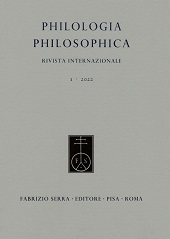Philologia philosophica : rivista internazionale
La storia del pensiero vive con le forme che offre la produzione letteraria, per non dire la produzione poetica, nel periodo arcaico e nel periodo classico strumento fondamentale per la diffusione di nuclei concettuali, di tormenti speculativi, di paradigmi etici. Da Omero al Socrate di Platone, da Esiodo al racconto di Parmenide, dalla lirica di Saffo e di Pindaro al dramma di Eschilo e di Sofocle, non ha senso distinguere fra la storia del pensiero e la produzione letteraria. Per la ricerca sul mondo antico non è possibile capire la storia del pensiero, fra paideia, fisica e slancio ideale, senza un contatto con la produzione letteraria e non è possibile capire la produzione letteraria senza un contatto con la storia del pensiero, che indica spesso motivi e canoni per la produzione letteraria.
Il vecchio attrito descritto e subito respinto da Platone, il vecchio attrito che non trova conferma nella biblioteca di Alessandria, ma è alimentato dall'estetica moderna per lo più su fragile base, nasconde una tensione creativa, una continua oscillazione fra due poli che non assumono mai dimensione assoluta.In questa rivista la filologia è ad un tempo restituzione critica del testo, che giunge su papiro, su codice o per tradizione indiretta, e interpretazione puntuale del testo, con meditata coscienza dei fenomeni di lingua e di stile, delle norme per le architetture dei generi, che la produzione letteraria plasma e che la storia del pensiero nel periodo ellenistico e nel periodo imperiale osserva.
Philologia Philosophica partecipa al dibattito internazionale richiamando la centralità del testo, spesso dimenticata per appelli fugaci al pur utile studio di ampie correnti culturali nel segno dell'identità. Prezioso compito della ricerca è scoprire le differenze, non sottolineare consuetudini o rapporti nel segno dell'identità, le differenze che nel testo emergono sia per la forza intellettuale del suo autore sia per la dinamica stessa del suo lungo viaggio nel tempo. Solo con la centralità del testo la produzione letteraria e la storia del pensiero riveleranno per la ricerca solide realtà, in grado, pur in questa fase non felice, di orientare, al di là di ogni confine, la riflessione matura sul passato dell'uomo. [Testo dell'editore]
The history of thought lives in forms of prose and poetry that were key in the archaic and classical ages for spreading concepts, philosophical conundrums, and ethical paradigms. From Homer to Plato's Socrates, from Hesiod to Parmenides, from the poetry of Sappho and Pindar to the tragedies of Aeschylus and Sophocles, it makes no sense to distinguish between the history of thought and literary production. It is not possible to understand the history of thought, between paideia, physics and ideal, separate from literary production, and it is not possible to understand literary production separate from the history of thought, with the latter being raison d'être and canon for the former. The ancient quarrel between them, described and immediately rejected by Plato and disproved by the Alexandrian scholarship has been fuelled by modern aesthetics mainly on weak grounds.
It hides a creative tension, a relentless swinging between two poles that do not ever surge to absolute proportions.In this journal philology is as much a critical restoration of the text, which might be preserved on papyrus, on a codex, or by indirect tradition, as an accurate interpretation of the text that is aware of the phenomena of language and style, as well as of the rules for the architectures of genres. These are shaped by the literary production and detected in the history of thought throughout the Hellenistic and imperial ages.
Philologia Philosophica takes part in international debates drawing attention to the central role of the text, which is often neglected by calls to study wide cultural movements, however useful, in the name of identity. A valuable task of research is exposing differences, not emphasising habits or relations in the name of identity, differences that crop up in the text out of the intellectual power of its author and the dynamics of its long journey through time. Only by giving the text its central role back will literary production and the history of thought disclose to research some sound realities that can steer a mature reflection on the human past, even in these unfortunate times. [Publisher's text]
-
Fascicules de la même revue (disponibles individuellement)
-
Informations
ISSN: 2785-387X
FRÉQUENCE
Annuale = Annual


